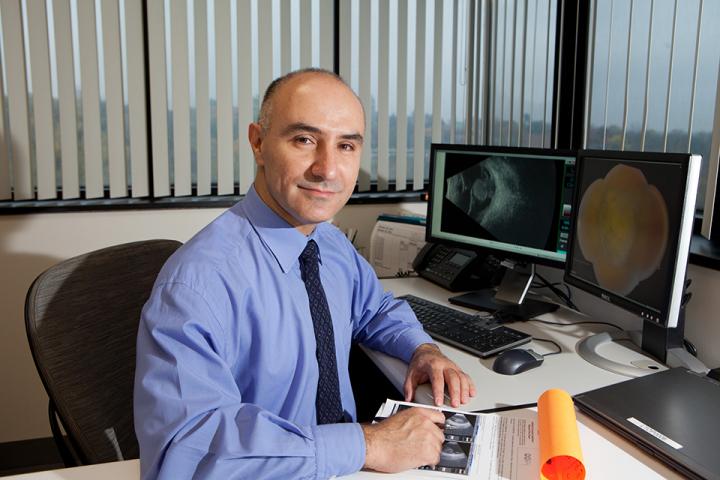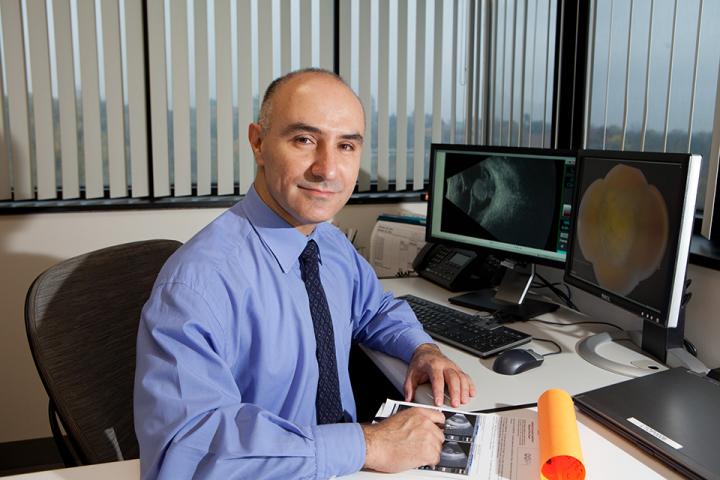
Credit: University of Michigan Kellogg Eye Center
ANN ARBOR, Mich. — New immunotherapy treatments offer a remarkable chance for survival for patients with advanced melanoma and hard-to-treat cancers of the bladder, kidney and lung.
But the treatments, designed to unleash the immune system to attack cancer, can also spur an assault on healthy organs, including the eye.
The cases of three recent patients, published by University of Michigan Kellogg Eye Center in JAMA Ophthalmology, highlight the issue. Patients receiving immune checkpoint inhibitors developed uveal effusions and eye inflammation that affected their vision.
Although it is rare, knowledge of this risk is important both for the ophthalmologists who treat it and for the oncologists prescribing the anti-cancer treatment, say Michigan Medicine researchers.
With certain inhibitor drugs, the anti-PD-1 (programmed cell death protein-1) and anti-PD-L1 (programmed cell death ligand-1) monoclonal antibody immune checkpoint inhibitors block the interaction between PD-1 receptors on T cells and their counterpart proteins, PD-L1. This blockage allows the T cells in the immune system to do their job: attack and kill the cancer tumor cells.
"In our three patients who had been receiving these immune checkpoint inhibitors, we noticed large uveal effusions. In addition, there was anterior chamber inflammation in two of our patients," says Hakan Demirci, M.D., the Richard N. and Marilyn K. Witham Professor at the University of Michigan Kellogg Eye Center.
All three patients were receiving an anti-PD-1 or anti-PD-L1 antibody immune checkpoint inhibitor drug: atezolizumab, nivolumab or pembrolizumab.
On development of uveal effusions, Merina Thomas, M.D., a senior vitreoretinal surgery fellow at Kellogg says: "It happened quickly, between one and three months after the patients had received at least two infusions of the immune checkpoint inhibitors. That raised our suspicion."
There's no treatment for the side effects of the immune checkpoint inhibitors other than stopping the medication. "We asked each patient's oncologist if the patient's immune checkpoint inhibitor could be discontinued," says Thomas.
"But not all patients can stop the therapy, because they have widespread, life-threatening cancer," adds Demirci.
In two of the three patients, six weeks to three months after stopping the medication, the uveal effusions had improved and the affected eye looked normal. The third patient with a uveal effusion continued with the immunotherapy for his melanoma, but he died four months later.
Immune response in the eye
In the wall of the normal eye, there are three layers with no fluid among them. But inflammation in the eye can cause the layers to swell and fluid to accumulate between the layers.
Uveal effusions can occur when patients have eye injuries or operations, receive certain drugs, or for unknown causes. When the uveal effusion involves the fovea, where eyesight is the sharpest, it affects the vision.
In a previous review of 576 patients treated with nivolumab, 71 percent had side effects such as fatigue, itching and problems with the gastrointestinal or endocrine systems. Another study noted that uveitis and dry eye were the only ocular toxicities in patients taking PD-1/PD-L1 inhibitors, with the incidence of uveitis ranging from 0.3 to 0.6 percent, and no specifics regarding the pattern or management of the uveitis.
But the Kellogg experts say it's important for oncologists to refer patients with eye problems to an ophthalmologist, and it's equally important for ophthalmologists who see patients with uveitis or uveal effusion to ask them questions about the medications they may be receiving.
More than other organs in the body, the eye is known as an immune-privileged site. The normal immune response to antigens is absent. This means corneal transplants are very successful because the antigens from the grafts seldom produce inflammation in the eye. High levels of PD-L1 in ocular tissues may play a role in the eye's immune privilege. Thus, blockade of the regulatory T cells might have played a role in the toxicity in these patients.
"The immune system is tricky. It can help fight cancer cells but can also start fighting the body itself and cause side effects such as the uveal effusions in these patients," says Thomas.
As the use of immunotherapy becomes more widespread, researchers plan to observe whether more patients are experiencing similar side effects.
###
Media Contact
Shantell M. Kirkendoll
[email protected]
734-764-2220
@umichmedicine
http://www.med.umich.edu
Related Journal Article
http://dx.doi.org/10.1001/jamaophthalmol.2018.0920





